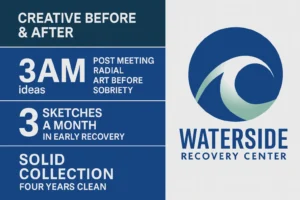I thought getting clean would kill my creativity.
That was the fear that haunted me long before I ever walked into treatment. I didn’t worry about withdrawal, the early mornings, or even having to tell people I had a problem. What I really feared—deep down—was that the things that made me me would disappear the moment I stopped using.
I told myself the drugs made me funnier. Braver. More interesting. That my boldest ideas came at 3am, backlit by chaos. I believed that sobriety meant silence. Safety. Boredom. Beige.
It’s wild how deep that lie runs.
The truth? Recovery didn’t erase me. It returned me.
Waterside’s drug addiction treatment program in Plymouth County didn’t strip away the fire. It helped me stop burning myself down with it.
Addiction distorted my self-image—but treatment helped me see clearly
At some point, I had fused my identity with my drug use. Every version of myself I’d shown the world was a little louder, a little faster, a little looser—because I was using. Friends knew me as the wildcard, the deep talker at parties, the spontaneous road trip guy. Without the drugs, who was I?
It terrified me to imagine that my personality was just an echo of my addiction.
In treatment, I found the opposite: my personality had survived addiction. I still cracked jokes. Still doodled on the edge of every notebook. Still stayed up late writing lyrics. Those parts weren’t manufactured by substances. They were real. They were mine.
Addiction had blurred the image. Treatment brought it back into focus.
Sobriety isn’t the end of creativity—it’s the rebirth of it
When I was using, creativity came in floods. Messy, chaotic floods. I’d sketch until sunrise, write song lyrics I’d forget by morning, build projects I never finished.
It felt inspired—but I couldn’t tell what was real and what was chemically inflated.
In recovery, creativity slowed at first. Then something strange happened: it deepened. I could focus longer. Finish things. Revisit drafts. Get feedback without spiraling.
I wasn’t creating to prove something or escape something. I was creating because it brought me peace. I wasn’t numbing—I was expressing. That was new. That was healing.
And it was sustainable.
I didn’t become a different person—I became more of myself
I walked into treatment expecting transformation. In a way, I got it—but not the kind you see in movies.
I didn’t shave my head, join a commune, or become a motivational speaker. I just remembered how to breathe. How to feel. How to want things again.
One of the counselors at Waterside said, “Addiction isn’t who you are. It’s just what you used to survive.” That line hit me like a punch to the chest. Because survival had been my only goal for so long.
When I got clean, I wasn’t chasing survival anymore. I was chasing meaning.
And in that pursuit, I found parts of myself I thought I’d lost—my patience, my curiosity, my ability to be alone without panic.
Your edge doesn’t disappear—it sharpens
I’ve always had a little edge to me. Sarcastic. Fast-talking. A little restless.
In active addiction, that edge was unpredictable and reckless. In recovery, that same edge became honesty. Humor. Courage. Vulnerability.
Recovery didn’t round me out—it gave me more control over the direction I pointed myself.
When I was using, I felt raw. Now I feel real.

Fear of losing yourself is normal—and not a reason to stay stuck
If you’re scared that getting clean will erase who you are, I want you to hear me: that fear is valid. And it doesn’t mean you’re broken or ungrateful or in denial.
It means your identity matters to you. That’s a good thing.
But if the only way you can hold onto your identity is by using, then maybe that version of “you” is costing too much.
You deserve to feel like yourself—without pain as the price of entry.
You deserve to be funny without being hungover. Creative without being numb. Alive without being on edge.
You don’t have to become a recovery cliché to get better
Not everyone in drug addiction treatment wears matching hoodies and chants affirmations at sunrise. At Waterside, we were painters. Moms. Musicians. Accountants. Angry. Hopeful. Quiet. Loud.
You don’t have to become someone else to heal.
You just have to be willing to let go of the version of you that’s only surviving.
The rest—the real parts—they stay. In fact, they grow.
Healing isn’t a betrayal of your past self
This one took me time.
I was loyal to the identity I built while using. Loyal to the wild nights, the rebellion, the friends I’d partied with.
But healing isn’t a betrayal of that person. It’s an evolution.
The wildness doesn’t go away—it finds healthier places to live. In hikes. In laughter. In music. In deep conversation. In vulnerability. In building something that lasts.
That part of you doesn’t need to die. It just needs room to breathe.
If you’re asking “Will I still be me?”—you’re already halfway there
That question means you care. It means you know the difference between sobriety and silence.
It means you want recovery—but not at the cost of your spark.
That was me. And here’s what I can tell you, from the other side:
- I still dance too hard at concerts.
- I still cry at dumb movies.
- I still write poetry no one reads.
But now I do it with clarity. And that clarity doesn’t dull the colors—it enhances them.
Words from Other Creatives in Recovery
“I used to think being sober meant losing my edge. Turns out, it meant finally owning it.”
– M., 2 years clean
“The paintbrush didn’t need the chaos. It needed me awake.”
– D., visual artist, 3 years sober
“I thought I was saying goodbye to passion. But recovery gave me a new language for it.”
– T., musician, 4 years clean
FAQ: Drug Addiction Treatment & Creative Identity
Q: Will I lose my creativity if I stop using?
A: No. In fact, many people report that their creative focus and emotional depth increase in recovery. Substances may have fueled intensity—but recovery fuels consistency and clarity.
Q: What if I don’t feel inspired without drugs?
A: Early recovery may feel flat at first. That’s normal. But creativity often returns stronger and more sustainable as your brain and body stabilize.
Q: Is recovery just for people who want to live a “quiet” life?
A: Not at all. Recovery looks different for everyone. Some want peace and stillness. Others want art, travel, passion. Waterside Recovery supports both.
Q: Do I have to give up my identity to get clean?
A: No. Good treatment helps you reclaim your true identity—one not overshadowed by the effects of drug use.
Q: I live near Bristol County. Can I access this program?
A: Yes. Whether you’re in Plymouth County or looking for drug addiction treatment in Duxbury, MA, Waterside can help you reconnect with yourself.
You don’t have to become someone else to heal. You just have to be willing to return to who you’ve been all along.
Call (866) 671‑8620 to learn more about our drug addiction treatment services in Plymouth County, MA.


